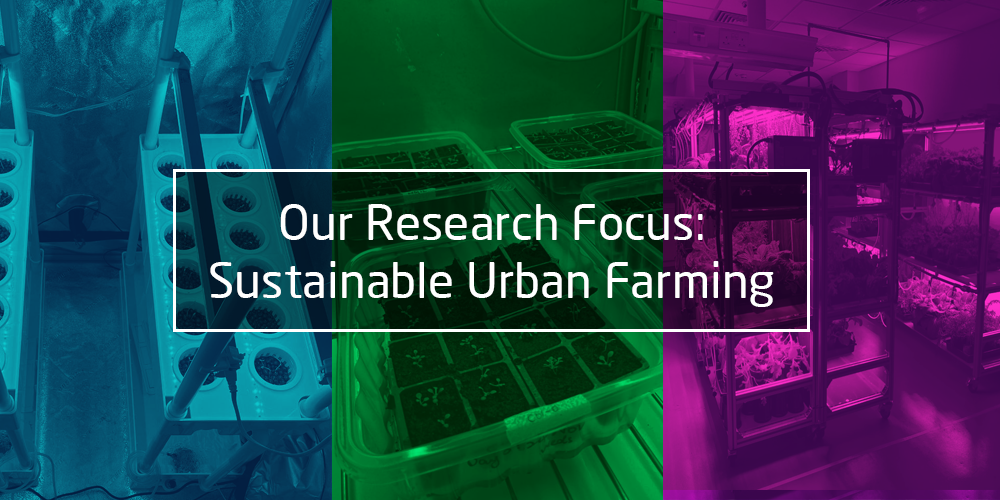Our research focus on Sustainable Urban Farming
Multidisciplinary research of urban farming to solve scientific and technological challenges in urban farming

What is Sustainable Urban Farming?
Our broad definition includes all aspects associated with the cultivation of food plants in indoor farms. We can also explore production of novel biotech products (e.g., nutraceuticals, proteins, novel biomaterials) via such ‘plant factories’. It is essential to integrate good environmental and farming practices for the long-term sustainability of urban farming by limiting potential pollutants and promoting public health.
Why should we develop an urban farming research thrust?
Rapid urbanization imposes an unprecedented pressure on cities to feed their residents. By 2050, over 60% of the world population will live in urban areas, and many of the large cities are in Asia. Additionally, consumers have become more discerning and expect higher quality fresh produce with added health and nutritional benefits. Collectively, these pressures highlight the urgent need to develop science-based solutions and technological innovations to shape the future urban farming systems.
Farming practices and technologies have undergone remarkable development and intensification during the past several centuries. In the face of challenges posed by the climate change and population increase as well as potential disruptions caused by pandemics and natural calamities, provision of adequate food in the coming decades will require a significant change in the way we grow crop plants.
The concept of urban farming has evolved with the idea of producing food plants under controlled environments. This technology combines low environmental footprint and offers us opportunities to reduce energy and water needed for crop cultivation. It will also eliminate the uncertainties associated with outdoor farming that relies heavily on farmland, good weather and water supply.
Mere adoption of the currently available solutions from traditional farming is inadequate for indoor farming, because this sector has its own special needs. Therefore, novel solutions that integrate multiple disciplines need to be developed from the core fundamental sciences, which requires multidisciplinary specialist teams to work together. We hope to be able to make novel contributions towards the success of Sustainable Urban Farming in Singapore.
We expect that the stakeholders (e.g., growers, food processors, distributors, retailers, consumers, and waste managers) will rapidly adopt novel scientific breakthroughs and solutions as soon as they are developed. In Singapore alone, a number of start-up companies have sprung-up in the recent past, indicating a strong interest in urban farming activities here.
Additionally, such plant factories could also be production sites for higher value nutraceuticals and biotechnological products.
Why do we need multidisciplinary research for accomplishing this?
As argued above, there is an urgent need to develop a fundamental understanding of food production systems in controlled urban environments. We propose that there is a fundamentally unique and novel opportunity for scientific understanding, because in urban farming, both the environment and organisms (mainly plants) can be controlled in highly interdependent manner, which has never been done to this fine-tuned level in the indoor farming space. Highly multidisciplinary research can be initiated if efforts are coordinated properly.
When we examine the overseas developments in the field, it is apparent that even the most advanced research systems are not able to produce economically viable urban farming systems by the efforts of single PI-driven laboratories.
What are some examples of multidisciplinary research for urban farming?
This will include developing:
• novel plant varieties using genome editing or genomic selection/ molecular breeding techniques
• microbiome approaches and beneficial microbial consortia to improve crops
• non-destructive sensors for plant metabolites & the environment to be used together with data science and artificial intelligence (AI) to rapidly develop optimal management solutions
• wavelength controlled LED systems
• produce novel materials from waste streams arising from plant cultivation
• Integrated pre-harvest production system followed by post-harvest processing
These highly fundamental and multidisciplinary research areas cannot fit within the R&D scope of small or medium companies. Hence, the present developments resort to the unsatisfactory approaches of integrating the off-the-shelf solutions. With integrated approaches that can be undertaken in a full spectrum university such as NUS, we have the potential to develop disruptive solutions for the emerging urban farming industry and make impactful contributions for societal benefits.
